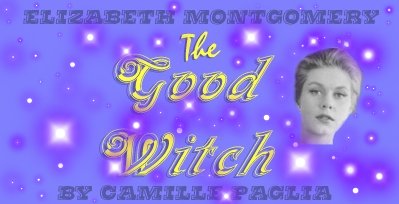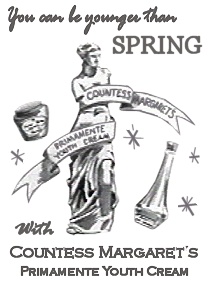 |
|
Submitted by SamSarah as originally appeared in the December 31, 1995 issue of New York Times Magazine.
As SAMANTHA STEPHENS, the witch-turned-suburban-housewife in Bewitched, Elizabeth Montgomery, a sunny, spunky, vaguely tomboyish blonde, was a transition from Doris Day, the marriage-minded virgin of the 1950's movies, to Mary Tyler Moore, the independent but vulnerable career woman of 1970's television. The series ran from 1964 to 1972 and has won new fans through its current broadcasts on Nick at Night. Like I Dream of Jeannie, which premiered a year later, Bewitched shows women as uncanny superior beings who renounce their magic powers to fit into their narrow domestic role in post-war America. Barbara Eden's Jeannie is far more overtly sexual than Montgomery's Samantha, who has the breezy, androgynous nick-name Sam. But even Jeannie ends up cozy and cuddly, unlike Kim Novak's eerie witch in the 1958 film Bell, Book and Candle. In Bewitched, Samantha struggles to be merely human, defending her bland domestic zone against a meddlesome clan of witches and wizards. Her battle-ax mother, Endora, ruthlessly heaps primeval scorn on Samantha's hopelessly square mate. On the show, men are oafish but endearing, and must be manipulated for their own good. Montgomery's Samantha still resonates because sexual relations remain turbulent -- romance is witchcraft for which no one knows the rules. Her Samantha was a superhero struggling to be merely human. A universal of world mythology, the witch symbolizes woman's special connection to nature, her mysterious command of the cycle of birth and death. Like Arthur Miller's Crucible, which was a canonical text when the show premiered, Bewitched suggests the tension between individualism and middle-class normality. Aspiring toward model good citizenship, Samantha forever remains the alien trying to "pass." Her spirited relatives are like flamboyant ethnic immigrants refusing to conform to the requisite WASP persona. Given what was going on in America at the time -- protests, assassinations, riots -- it is clear how situation comedy often is a comforting preserver of established social values. Scolding and taming her apparitions, Samantha resembles Sgt. Joe Friday, sternly battling the insane excess of the occultist, psychedelic 60's. Montgomery's father, the actor Robert Montgomery, was a staunch conservative who inveighed against the triviality of television, where his daughter, who was active in liberal causes, won her greatest fame. Elizabeth Montgomery's bewitching duality as Samantha, who both accepts and subverts social limits, may have come from her complex attitude towards her father's America, which she wanted to respect and yet to reform. |
| Advertisement |
 |
